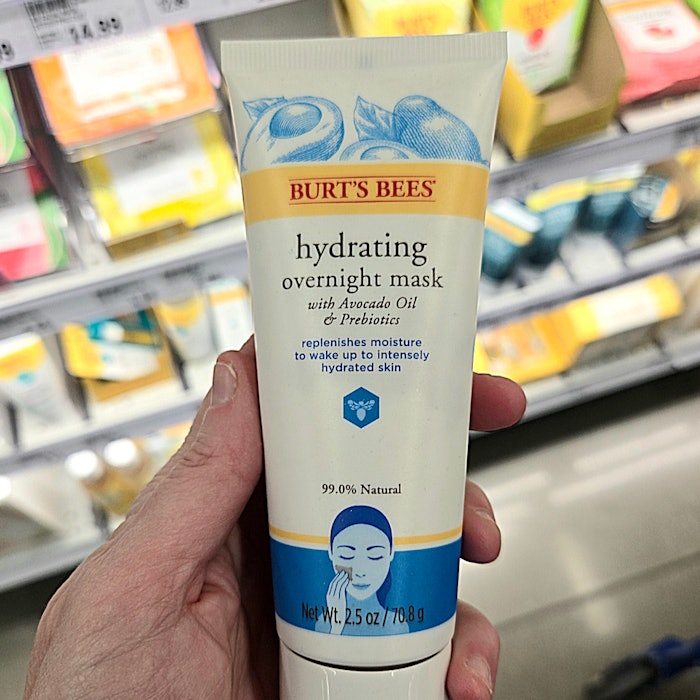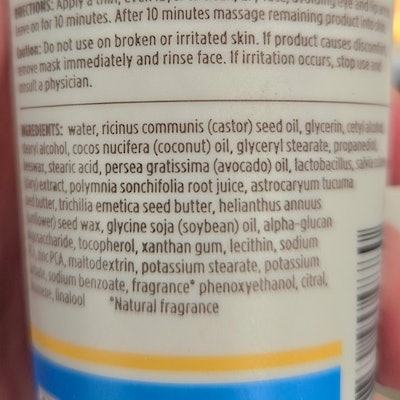
The market for microbiome-focused skin care has boomed in recent years. Grand View Research expects it will expand at a CAGR of 11.5% from 2024 to 2030. Growing awareness of the significance of the skin microbiome, coupled with a rising incidence of skin conditions, are driving this market. Ongoing R&D activities are led by challenges including the unique needs of each individual's skin microflora, the lack of standardization and growing consumer demand for personalized skin care. As such, validated, standardized and clinically supported products are needed, which can support the healthy balance of skin bacteria through a few approaches: prebiotic, probiotic and postbiotic. Burt's Bees Hydrating Overnight Mask with Avocado Oil and Prebiotics provides an example.
Log in to view the full article
The market for microbiome-focused skin care has boomed in recent years. Grand View Research expects it will expand at a CAGR of 11.5% from 2024 to 2030. Growing awareness of the significance of the skin microbiome, coupled with a rising incidence of skin conditions, are driving this market. Ongoing R&D activities are led by challenges including the unique needs of each individual's skin microflora, the lack of standardization and growing consumer demand for personalized skin care. As such, validated, standardized and clinically supported products are needed, which can support the healthy balance of skin bacteria through a few approaches: prebiotic, probiotic and postbiotic. Burt's Bees Hydrating Overnight Mask with Avocado Oil and Prebiotics provides an example.
Burt's Bees Hydrating Overnight Mask with Avocado Oil and Prebiotics
Burt's Bees Hydrating Overnight Mask is reportedly designed to replenish moisture over night for intensely hydrated, refreshed and health-looking skin by morning. The 99% natural formula includes nourishing and hydrating botanicals such as avocado, a superfruit rich in fatty acids, as well as prebiotics to help support a healthy microbiome.
While the prebiotics are not directly called out in this formula, the alpha-glucan oligosaccharide and various plant-based ingredients could lend this effect. Interestingly, Lactobacillus is also listed, which is more often used as a probiotic.
Providing 24 hr hydration, the dermatologist-tested formula is gentle on skin and contains no parabens, phthalates, SLS, petrolatum or synthetic fragrances. In addition, it is Leaping Bunny certified, uses responsibly sourced ingredients and integrates mindful packaging, among other considerations.
'Prebiotic' Skin Care Considersations
As Lawrence and Ceccoli explained, of the three main types of microbiome-modulating materials, the prebiotics category is the most widely used. It is also perhaps the most nebulous in terms of distinction.
As with many other microbiome terminologies, prebiotic originated with the gut microbiome. Its official definition was established in 2017 as "a substrate that is selectively utilized by host microorganisms conferring a health benefit.”
Take, for example, the sugar sucrose. Sucrose promotes the growth of S. epidermidis, which has been shown to repel the growth of C. acnes cultures. So in the broadest sense, a topical prebiotic is intended to influence the growth of one or more members of the skin microbiota.
This definition becomes problematic, however, as skin care research has increasingly shown that ordinary topical ingredients can impact the growth of microbes on the skin regardless of whether they were intended to do so. For example, many component materials of skin moisturizers are excellent nutrients for certain microbes to flourish, particularly in the context of popular “preservative-free” materials.
What's more, alterations in personal hygiene practices can modulate the chemistry of the skin and thereby alter the resident microbes. Findings such as these have provoked questions about what the normal state of microbial diversity is in healthy skin. Answering this question has become a major undertaking, as Larry Weiss, M.D., explained in an SCC keynote in 2023.
User Feedback: Burt's Bees Hydrating Overnight Mask
Following are example user reviews (edited for style), selected for their anecdotal insights on product form and function:
- I use this daily as a night cream...a small amount does my whole face and neck. I even put it on my lips when they get chapped, and they are healed by the next morning.
- Immediate results. Smooth and soft after first night.
- Unbelievable results for my mature skin. The loose, dry, crepey, deep lines of the neck region are significantly reduced with a firm overall appearance. An overall improved texture to the face with a brighter, youthful appearance is a wonderful experience to wake up to each morning.
- It moisturized my skin extremely well, and it left an amazing texture in the morning.
- I love how it’s thick but absorbs into the skin leaving a lightweight feeling.
- I have been struggling with perioral dermatitis on and off for years, and this cream is a god sent. No more dermatitis and it's even healed the scars from my dermatitis.
Ingredients: Burt's Bees Hydrating Overnight Mask

Water (Aqua), Ricinus Communis (Castor) Seed Oil, Glycerin, Cetyl Alcohol, Stearyl Alcohol, Cocos Nucifera (Coconut) Oil, Glyceryl Stearate, Propanediol, Beeswax, Stearic Acid, Persea Gratissima (Avocado) Oil, Lactobacillus, Salvia Sclarea (Clary) Extract, Polymnia Sonchifolia Root Juice, Astrocaryum Tucuma Seed Butter, Trichilia Emetica Seed Butter, Helianthus Annuus (Sunflower) Seed Wax, Glycine Soja (Soybean) Oil, Alpha-Glucan Oligosaccharide, Tocopherol, Xanthan Gum, Lecithin, Sodium PCA, Zinc PCA, Maltodextrin, Potassium Stearate, Potassium Sorbate, Sodium Benzoate, Fragrance (Natural Fragrance) Phenoxyethanol, Citral, Limonene, Linalool.
Ingredient disclosure shown as provided on Burt's Bees website on Feb. 16, 2025










